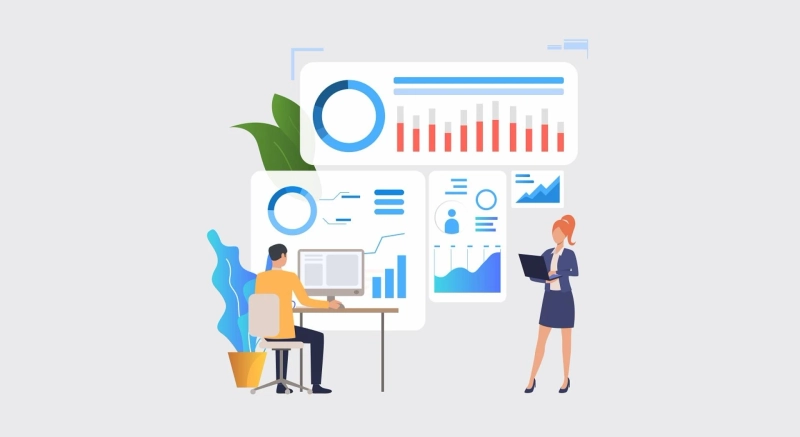Business data can lose its value quickly, and poor-quality information often takes a toll on sales performance and customer relationships. Data enrichment services resolve this issue by adding fresh, accurate details to customer records that lead to smarter business choices.
CRM data enrichment empowers companies to sharpen their sales strategies. B2B data enrichment builds detailed customer profiles that help sales teams target prospects more accurately. A specialized data enrichment company can turn basic records into powerful sales intelligence.
This piece explores how data gaps affect sales performance and the ways enrichment makes lead scoring better. Our practical tips will help you improve your CRM's accuracy and boost conversions.
Common CRM Data Gaps That Hurt Sales Conversions
Incomplete information in CRM systems reduces sales effectiveness dramatically. These gaps create major barriers between potential customers and successful conversions. Let's get into the most critical data shortfalls that affect sales performance.
1-Missing Firmographic and Technographic Details
Most CRMs lack basic company information needed to target effectively. Firmographic data are the foundations of proper account segmentation and qualification. This includes industry classifications, company size, revenue figures, and locations. Without these details, sales teams struggle to identify high-potential opportunities.
Technographic enrichment identifies the technologies on which current prospects depend, ranging from software subscriptions and hardware configurations. Without technographic information, sales teams can't match their product solutions with a prospect's current technology infrastructure. They also miss chances to spot integration possibilities and to position their solutions as strategic upgrades to existing systems.
2-Outdated Contact and Behavioral Data
Within less than a year, most business cards become outdated because of changes in new job titles, or addresses. This evolution of contact details leads to inefficiencies and sales teams tend to waste their time following inaccurate information. Poor-quality B2B data disrupts outreach and hampers nearly half of all sales teams' ability to effectively connect with prospects.
Behavioral data needs regular updates to stay reliable. This includes tracking customer actions like website visits or email engagement. Outdated behavioral information leads to wrong assumptions about customer interests and poorly timed outreach.
3-Siloed Data Across Marketing and Sales Platforms
The divide between sales and marketing data causes the biggest problems. These departments often work separately and use distinct systems that create information barriers. Marketing teams might use email platforms and analytics dashboards while sales teams rely on CRM systems. This creates disconnected pools of data.
This divide leads to several issues:
- Marketing wastes budget driving support calls instead of sales calls
- Sales teams lack context and find it tough to understand what drives customer engagement
- Conversion rates drop due to inconsistent customer experiences
- Companies overestimate acquisition costs
Companies can bridge these gaps by using specialized data enrichment providers. These services create unified customer views with consistent data standards across platforms. This ensures both teams work from the same accurate information. The result? Better conversion rates through improved alignment.
How CRM Data Enrichment Improves Lead Scoring and Targeting
Sales efficiency transforms when teams prioritize prospects that are most likely to convert. CRM data enrichment services provide crucial insights through three key data types:
I) Behavioral Data for Intent-Based Scoring
Behavioral data reveals prospects' digital footprints and their true buying intentions. Sales teams track website visits, content downloads, email engagement, and event participation. These indicators demonstrate potential intent and readiness to buy.
Research shows that companies that exploit behavioral data in their lead scoring models improve conversion rates by 79%. By prioritizing prospects who actively engage, sales teams can focus their efforts on leads that are more likely to convert.
Advanced CRM data enrichment tools analyze patterns across several touchpoints, and score leads as hot, warm, or nurture, based on particular actions. This way, teams can reach out at the right time when the prospect is ready to engage.
II) Firmographic Enrichment for B2B Segmentation
Firmographic data builds accurate company profiles by adding depth to basic contact information with industry classification, company size, and revenue figures. This detailed picture enables precise B2B segmentation.
Companies that partner with specialized data enrichment providers get access to extensive firmographic databases that introduce multiple benefits. Organizations using firmographic segmentation report higher conversion rates through targeted outreach. These results are achieved by delivering messages that address specific industry challenges and company needs.
III) Technographic Data to Match Product Fit
Technographic enrichment identifies the technologies that current prospects rely on, ranging from software subscriptions and hardware configurations to their entire tech stack. This information enables sales and marketing teams to position their solutions as easy add-ons or strategic enhancements in each prospect's current ecosystem.
Technographic data is among the strongest product fit signals, especially for B2B companies selling technology solutions. Understanding a prospect's existing technology environment enables salespeople to demonstrate how their product interacts with or enhances already installed infrastructure.
Best Practices to Outsource Data Enrichment Effectively
Companies need planning and clear processes to implement data enrichment successfully. Organizations that follow proven best practices protect data integrity and maximize their ROI through accurate insights.
i- Define Enrichment Goals and KPIs
Your data enrichment needs to have definite, quantifiable objectives. You don't necessarily need to capture every possible data point. Capture information that is applicable to your business goals. You may need to improve lead scoring or develop targeted marketing campaigns. Definite objectives will assist you in selecting the right data points and types of enrichment. Define KPIs to measure success based on better conversion rates or higher engagement levels.
ii- Ensure GDPR and CCPA Compliance
Data privacy compliance is essential when outsourcing data enrichment. Your processes should meet privacy standards such as GDPR and CCPA prior to enriching records with third-party information. Proper encryption and access controls within a strong cybersecurity system will safeguard personal data. You should also maintain detailed records of data processing activities to demonstrate regulatory compliance.
iii- Integrate Enrichment into CRM Workflows
B2B data enrichment must be integrated with every department and workflow to find valuable cross-selling opportunities. Ongoing, timely updates give you stronger decision-making and an improved overall customer experience. Well-integrated data enrichment enables you to squeeze the most value from your CRM system and drives revenue growth through uniform data standards.
iv- Combine Enrichment with Regular Data Cleansing
Data cleansing is important in enhancing the efficiency of data enrichment. Regular auditing and maintenance of your company database ensures that you enrich reliable, clean data instead of faulty or irrelevant information. This results in accurate information that boosts enrichment efforts.
Conclusion
Data enrichment services turn basic CRM applications into potent sales conversion platforms. Successful CRM data management requires the combination of firmographic and technographic information to segment customers and product offerings properly.
Behavioral insights show authentic buying intent and allow sales teams to rank prospects with the highest likelihood of conversion. Silos between marketing and sales teams create disconnects that bog down decision-making. An enrichment-driven approach can break down these barriers.
Best practices help implement data enrichment strategies effectively. Reliable enrichment depends on a combination of clear objectives, privacy compliance, and smooth workflow integration. These practices help businesses maximize the return on their enrichment efforts.
A data enrichment company does more than fix inaccurate records. It provides vital intelligence that propels business development. Organizations that use comprehensive enrichment strategies gain significant advantages through better targeting and more personalized outreach.



